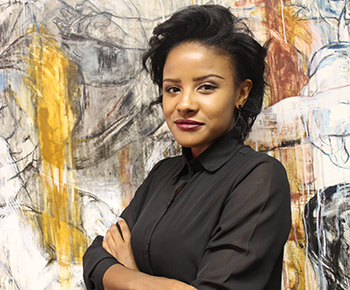
Candice Thikeson’s name will be added to the Mandela Rhodes Scholars book
Photo: Valentino Ndaba |
Candice Thikeson was recently selected as the only 2016 Mandela Rhodes Scholar from the University of the Free State. She is one of 50 young African postgraduate students, eager to contribute positively to the educational development of the continent.
The Mandela Rhodes scholarship is a fully-funded postgraduate scholarship awarded to promising future leaders by the Mandela Rhodes Foundation. It is named after the former president of our country, Nelson Mandela, and Cecil Rhodes, who was known for his business skills and political influence in South Africa. Instituted in 1999, the scholarship aims to advance scholars who demonstrate the principles of Leadership and Reconciliation embodied by Mandela and Rhodes’s legacy, as they relate specifically to Education and Entrepreneurship.
Thikeson expects the programme will educate her on how to integrate the four pillars in relation to her field of study.
For Thikeson, earning the scholarship served as an endorsement of her dream of becoming an academic. “I want to obtain a PhD, lecture at a university, publish papers, and speak at conferences,” she related. “I also want to produce academics, I want to mentor young people,” she added.
Her academic journey began in 2011 when she pursued a BA Fine Arts degree for a year. Thikeson then transferred to a BA General degree which she completed over two instead of the standard three years. She went on to study an Honours degree in Art History and Visual Culture Studies. In the same year, she travelled to Rijksuniversiteit Groningen (University of Groningen) in the Netherlands as part of an exchange agreement between the university and the UFS, where she completed her mini-dissertation in four months. Both her BA and Honours were passed with distinction. Currently, Thikeson is pursuing a Masters degree at the Department of Art History and Image Studies under the supervision of Prof Suzanne Human.
Some accolades to her name include the Jan Teurlinckx Prize for the best student in Art History (2011), the David Jacobs Prize, awarded to the best student in Philosophy (2013), and the Richard Miles Prize, presented by the Dean of the Faculty of the Humanities (2013). Thikeson was also selected as a member of the Golden Key Honour society in 2012, for her consistent academic excellence.
Last year, Lehlohonolo Mofokeng, Zola Valashiya, and Tumelo Morobane made the UFS proud by graduating as the class of 2015 Mandela Rhodes Scholars.